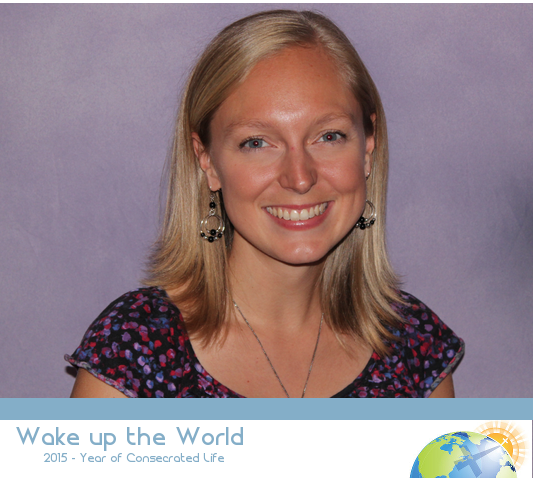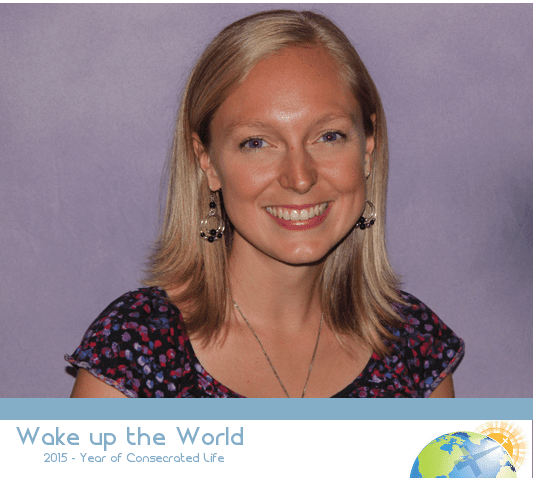Buen provecho!
 Buen provecho! Sister of Charity of Cincinnati, in her monthly column for Global Sisters Report for the National Catholic Reporter, reflects on lessons she first began to learn some 7 years ago in Ecuador. She offer much food for thought in Buenprovecho.
Buen provecho! Sister of Charity of Cincinnati, in her monthly column for Global Sisters Report for the National Catholic Reporter, reflects on lessons she first began to learn some 7 years ago in Ecuador. She offer much food for thought in Buenprovecho.
It was September, and we had been in Ecuador for almost two months.
As Rostro de Cristo volunteers attempting to live simply in intentional community, we didn’t have many treats. We shared a weekly food budget of $60 and shopped at the local corner stores like our Ecuadorian neighbors, getting as creative as we could with the basic ingredients offered there: potatoes, tomatoes, peppers, bread, noodles, onions, eggs, milk and other fruits or vegetables depending on the season.
On this particular September Sunday, we realized there was some left-over money from the previous week. Two of my community mates decided to try a banana cake recipe they’d read about. Finally! It had been too long since we’d tasted home-baked dessert. We waited in joyful hope as they mixed delicious ingredients at our kitchen counter and put the pan in the oven. A sweet aroma danced through the house, priming our senses for post-meal paradise.
By the time we finished dinner, we had to leave for Mass. The moment we’d been waiting for would have to wait a little longer. We placed the pan back in the oven and latched the door. I’m sure I prayed during Mass, but I don’t recall. I do remember the seven of us climbing out of the van and practically running into the kitchen when we returned home an hour later. Gina retrieved our delectable cake from the oven. She plunked it on the counter and proceeded to pull back the covering.
Her eyebrows shot up, and her mouth gaped into a capital O. We all looked down.
“Nooo!” we said in unison.
Our cake was infested with ants! There were hundreds of them, crawling and swarming all through the spongy sweetness.
You have to know, ants were everywhere in our house. If you left a piece of food on the counter for even a few moments, an ant parade would appear almost instantaneously. We were used to protecting our food from our insect friends but we never imagined that they would get into our carefully closed oven and find our cake.
We all stared at the cake-turned-ant-farm, not wanting to believe it was true.
Then, Colie had an idea.
“You guys — ” she glanced over at the stove and smiled. “We could put the cake back in . . . and turn on the oven for a while.”
Soon, we were all smiling wryly, looking back and forth at one another like little kids about to do something their moms told them not to do. We shrugged, and then enthusiastically agreed that we would try it. We warmed our cake and brought it out again. Our little ant friends were no longer living.
As they say in Spanish, “¡Buen provecho!” (Bon appetit!)
It sounds silly now, but we scraped as many ants as we could off of the top, and then, we went for it. Desperate times, folks! We sat around that cake and dug with a knife, a spatula, and our hands, scooping, picking ants out and lifting bites to our mouths. It was fluffy and smooth and oh-so-delectable. We laughed as we went, amused that we were actually doing this but with no plans to stop. It tasted so good, and we may have been getting extra protein to boot. We ate the whole thing.
I’m not sure why, but this memory came to me last night as I sat on a pillow in our house prayer room and talked to God. I chuckled; I think God did, too. It still makes me laugh even seven years later. It also symbolizes something of what my experience in Ecuador taught me about joy and gratitude. It might go a little something like: Don’t let the ants keep you from enjoying the cake!
Our Ecuadorian neighbors face utter pain and struggle in their daily lives. Water, food, safety and shelter are not givens. Alcoholism, drug abuse, abandonment, adultery and violence run rampant.
And still, those people showed me what joy is.
I’m not talking about surface-level happiness. Often, when visitors come to Ecuador for a short time, they say things like, “Wow! These people are poor, but they’re so happy!” Yes, they are hospitable, kind and friendly. But when trust and real relationship grow, they might let you into their darkness. There is often pain, fear, hurt, trauma and anxiety buried deep within. And it is not okay that our world keeps people chained in such oppression.
Still, in the midst of it all, I found myself in awe of a resilient people who seem to choose to savor the joy in life. The culture knows how to celebrate! They know how to delight in creating culinary masterpieces and sharing with all who come to the table. They know how to dance. They find humor and laugh uninhibitedly, freshly and purely. They give “gracias a Dios” always and for everything.
Their joy is raw, real and rooted. It’s a joy that bubbles up in spite of great hardship, without illusion and without ignoring pain. It’s a joy that comes from an awareness of God’s presence and a reliance on that Presence.
How much I admire the ability of some people in economic poverty to live out of authentic joy and gratitude. In my own poverty, it is a lesson that I work with every day.
All too often, I focus on the “ants” and let them ruin the “cake.” I’m good at lying down at night and replaying the few negative moments of the day instead of giving thanks for the many positive ones. I’m good at letting what I see as shortcomings in someone overshadow their overwhelming God-given goodness.
Again, I’m not talking about some false, naive euphoria. I’m not talking about sticking my fingers in my ears and singing, “La la la,” while humans are trafficked, while refugees pour out of Syria, while gun violence takes our young people, and while our lifestyle destroys our planet. We must look at these things, and we must respond. I am talking about what I saw so clearly in my Ecuadorian neighbors: a heart wide open to Goodness and filled with gratitude.
It’s like the man I met in line at the food pantry on Monday. He wore beat-up jeans and a ratty Bengals sweatshirt. He had just spent a few hours standing outside in the unforgiving morning chill in order to get a bag of food. Still, he caught my eye and said, “How are you today, young lady?”
“I’m good, and you?” I chimed back.
“I’m blessed!” he said heartily. “Wanna know why?”
“Why?” I smiled.
“’Cause I woke up today,” he replied, nodding for emphasis. “Praise God!”
It’s like Derrick Jamison, a man I recently met who spent over 20 years on death row and then was exonerated, an innocent man after all. He is gentle and full of life. How is he not bitter? “I saw those wardens,” he says. “They were angry people, full of hate. I don’t wanna be like them. I don’t wanna live like that. So I forgave. I’m enjoyin’ life!”
I’m not sure exactly what holiness is, but they exude it. The world has kicked these people down, and yet they still choose joy. They are saints.
I pray for the grace to become a little more like my Ecuadorian friends, like the man in the food pantry, and like Derrick.
So, your fresh-baked cake might become invaded with ants. Life isn’t always exactly as we hope. But wait! Don’t let the ants ruin everything! Pull out your spatula and scoop up a big ol’ helping. Savor the goodness, and give thanks. ¡Buen provecho!
[Tracy Kemme is a Sister of Charity of Cincinnati. Author of the blog, Diary of a Sister-in-Training, Tracy is excited about the future of religious life! She currently ministers at the Catholic Social Action Office in Cincinnati and as the Latino Ministry Coordinator at a local parish.]
Be sure to visit Global Sisters Report for more reflections like this.
Tags:







Hello Tracy,
Great article and I know you are so right with the joy and happiness of the people.
Keep up the good work and God bless you.
I love to traveler to the poor undeveloped countries.
Ray
Enjoyed your writing here, Sister Tracy. Reminds me of times in Guatemala–the unbeatable faith and joy of the people who live most simply with so little, even after coming through times of terror and violence. May we continue to learn from them.